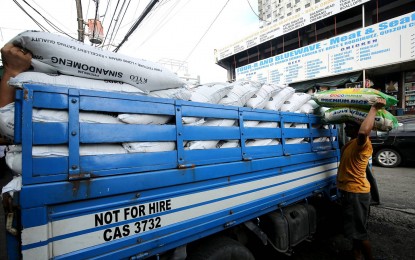Rice tariff reduction may slash prices by as much as P6 per kilo

IMPORT TARIFF. A worker unloads sacks of rice from a delivery truck at Mega Q Mart in Quezon City on Monday (Sept. 11, 2023). The Department of Finance is proposing to reduce by 35 percent the rice import tariff rates, which could bring down the price of imported rice by as much as PHP6 per kilo. (PNA photo by Joan Bondoc)
MANILA – The Department of Finance’s (DOF) proposal to reduce the 35-percent rice import tariff rates could bring down the price of imported rice by as much as PHP6 per kilo, a lawmaker said on Monday.
Albay 2nd District Rep. Joey Salceda said the temporary reduction of rice import tariffs to 10 percent is a “viable solution” for present rice price issues.
Salceda said the decision is “best left to the President” and his power to adjust tariff rates when Congress is not in session, noting that the legislature only has three weeks left before it goes on a month-long break.
“In general, I am supportive of ensuring that we have all the options necessary to meet our local demand and reduce the consumer price of rice,” he said.
The tariff reduction would also not compromise the implementation of the Rice Competitiveness Enhancement Program since the PHP10 billion in tariff revenues required to fund them have already been met by this year’s collections, Salceda noted.
Salceda suggested that the rice tariff reduction should be accompanied by more aggressive palay buying operations by the National Food Authority (NFA) to ensure that the surge in imports does not unduly depress farmgate prices.
He, however, reiterated that the long-term and sustainable solution is still to produce more rice domestically in a way that is “resilient” to climate risks.
“Actually, the PBBM administration has achieved a 3-percent growth in palay harvest for 2023. We are poised for a bumper crop year this year. We need to reduce our dependency on rice imports to protect us from rice trade volatility. That is the direction of this administration,” he said.
In his weekly press chat last Friday, DOF Secretary Benjamin Diokno said while price controls, when carefully calibrated and closely implemented, are effective in the near term, they also have adverse effects if allowed to linger for a longer period.
“The President has directed the economic team to implement measures that will mitigate the negative impact of the price controls on rice retailers and farmers,” Diokno said. “We need to adopt a comprehensive approach to help ensure that rice supply remains sufficient at reduced prices.”
The DOF is also encouraging the timely importation of rice by the private sector; full implementation of the Super Green Lane that authorizes the use of Electronic Data Interchange that will allow the advance processing and clearance of the shipments of the country’s topmost qualified importers; and cooperation with tollway concessionaires and operators for the temporary exemption of trucks that cater to agricultural goods from the increase in toll fees. (PNA)






